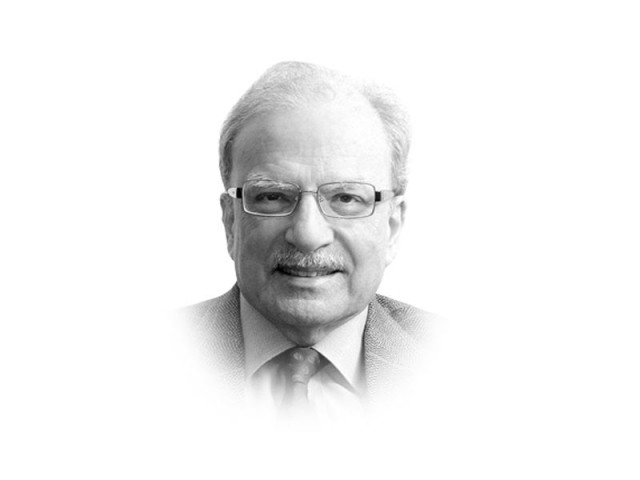Pakistan heading towards sustainable democracy
Likely success in building democratic order could set example for world at large

The writer is a former caretaker finance minister and served as vice-president at the World Bank
Corruption will be defined broadly and include not only the public resources that were reported to be pocketed by the rulers at all levels, thus depriving the people of the services they expected to receive. Large-scale corruption was resulting in the transfer of huge sums of money to foreign accounts by processes called ‘money laundering’. These moves were revealed by the so-called Panama Papers which recorded the working of a large Panama-based firm that had helped thousands of powerful and allegedly corrupt people to indulge in these practices. The Panama Papers became the basis of the unseating of prime minister Nawaz Sharif even though he had the support of a large majority of the members of the national assembly. While Sharif left the office, he held a number of well-attended rallies across the country maintaining that the verdict against him was not legitimate. He was, in his words, going to the “court of the people” to pronounce the final judgment in his case. The coming elections, in other words, would be a referendum on the removal of Sharif from office.
The elections will also be important since the citizenry will have the opportunity to pronounce judgment on the structure of institutions in the country and their relations with one another. Three such institutions are important. The first is the system of accountability called the National Accountability Bureau. The corruption watchdog was established by the government of president Pervez Musharraf with broad authority. It can detain people on the basis of suspicion of corruption. Some of its recent moves have caused a great deal of angst and anxiety among the senior ranks of the administration. Should the law that established the bureau be amended? This question will have to be taken up by the new parliament.
Then there is the role of the judiciary. Under the present chief justice the Supreme Court has ventured into the areas that are the domain of the executive branch of the government. The judge has extensively used the suo motu provision in the Constitution on the ground that those in authority are failing to provide the services citizens expect from the government.
The third issue that will get addressed by the new administration concerns the role of the military in politics, in particular Pakistan’s relations with the external world. It is unlikely that the military will ever intervene directly and take over the functioning of the government. That said, the men in uniform consider themselves to be better custodians of the country’s strategic interests. They don’t believe that politicians in charge of policymaking would fully protect Pakistan’s interests. This is certainly the case concerning the handling of the country’s nuclear arsenal. But to get back to the importance of the coming elections.
If all goes along the plans in place, Pakistan would be an exception to what is happening in much of the world. “Democracy faced its most serious crisis in 2017,” Freedom House, a democracy watchdog, reported in January this year. “Seventy-one countries suffered net declines in political rights and civil liberties, with only 35 registering gains.”
There was a time not too long ago when the United States’ political system was seen by other parts of the world as the example to follow. After the collapse of the Soviet Union and the death of Communism in Eastern Europe, there was the strong belief that the world had settled down to follow one system of governance: western liberal democracy in which power flowed from the citizenry to those elected to manage government affairs. Elections were to be held on a regular basis as a way of the citizens to register their views about the quality of governance.
In a situation such as this, the world would have looked at America for leadership. But Freedom House said America has “retreated from its traditional role as both champion and an exemplar of democracy.” President Trump has special affinity with the world’s authoritarian rulers. According to one commentator, Fred Hiatt, editor of the editorial pages of The Washington Post, the American president “glamorises dictators more than democrats: cheering when China’s ruler declared himself president for life; laughing with the Philippines’ strongman as he demonised reporters; congratulating Egypt’s dictator for his sham reelection; itching to withdraw from Syria to leave that field to Iran and Russia; abandoning human rights improvement as a policy objective anywhere in the world; and so on.”
It has been revealed that some of President Trump’s former senior advisers were distressed about the direction the United States was taking under President Trump. “Revisionist and repressive powers are attempting to undermine our values, or institutions, and our way of life,” said Lt Gen HR McMaster, who was until recently the national security adviser in the Trump White House. He was speaking at the Atlantic Council. “We are presently engaged in competitions with repressive and authoritarian systems to defend our free and open societies. We must be confident. We must be active. We cannot be passive and hope that others will defend our freedom.” Pakistanis can follow the same advice. Its likely success in building a democratic order could set an example for the world at large.
Published in The Express Tribune, April 16th, 2018.
Like Opinion & Editorial on Facebook, follow @ETOpEd on Twitter to receive all updates on all our daily pieces.














COMMENTS
Comments are moderated and generally will be posted if they are on-topic and not abusive.
For more information, please see our Comments FAQ